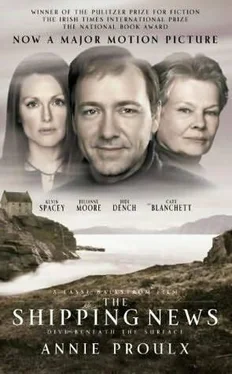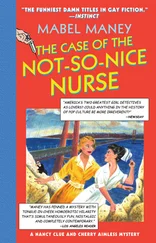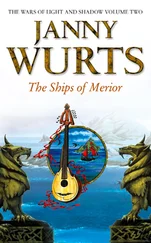Billy kicked in. “That’s how the old komatiks, the sleds, was made. There wasn’t a nail in them. All lashed with sinew and rawhide.”
Nutbeem ignored the interruption. “I liked the way the boats looked, but I didn’t do anything about it. After a blowup with the feculent Times bloater-lying there on his waterbed playing the paper comb and drinking black rum-I flew up to Houston, Texas-don’t ask me why-and bought a touring bike. A bicycle, not a motorcycle. And I pedaled it to Los Angeles. The most terrible trip in the world. I mean Apsley Cherry-Garrard with Scott at the pole didn’t have a clue. I endured sandstorms, terrifying and lethal heat, thirst, freezing winds, trucks that tried to kill me, mechanical breakdowns, a Blue Norther, torrential downpours and floods, wolves, ranchers in single-engine planes dropping flour bombs. And Quoyle, the only thing that kept me going through all this was the thought of a little boat, a silent, sweet sailboat slipping through the cool water. It grew on me. I swore if I ever got off that fucking bicycle seat which was, by that time, welded into the crack of me arse, if ever I got pried off the thing I’d take to the sea and never leave her.”
The phone rang again.
“ Gammy Bird! Yut. Yut, Jack, he’s here. No, Nutbeem’s just gone to cover a fire. Marcus’s Irving station. Four Hands Cove. I dunno. They just give me a number. Yut. O.k. Soon’s he comes in. Quoyle, it’s Jack again. For you.”
“What stories you done this week?” Voice bullets shooting out of the receiver and into his ear.
“Uh. The truck wreck. I just finished that.”
“What wreck was that?”
“A semi lost it on the curve coming down into Desolation and rolled. Loaded with new skimobiles. Half of them fell in the water and every boat in the harbor started hauling them out with grapnels. Driver jumped. Nobody hurt.”
“Don’t forget the shipping news.” The phone went dead.
“NUTBEEM! You better get on that fire before it’s out and you can’t get any nice pictures of leaping flames. And take the camera. It’s helpful when you have to take pictures.” Scratchy sarcasm.
“Why don’t you get a nice little rodney?” said Billy Pretty. “Oh now’s the time to pick up a beauty. You could jig for guffies on the weekend, get your picture took by tourists. You’d look good in a boat.”
But Nutbeem wasn’t ready to leave. “So, Quoyle, there I was back in London, starving again. At least I had my tape collection intact. But I knew I had to have a boat. I was in despair. You may think that the equation is ‘boat and water.’ It’s not. It’s ‘money and boat.’ The water is not really necessary. That’s why you see so many boats in backyards. Not having any money I was in despair. I spent an entire year reading books about boats and the sea. I began to hang about boatyards. There was one place where two young chaps were building a rowboat. They seemed to be doing a lot of planing-I’ve always thought planing rather jolly-and it came to me. Just like that. I would build my own boat. And I would sail it across the Atlantic.”
“NUTBEEM!” roared Card.
“Oh go spell ‘pterodactyl,’ ” said Nutbeem, hauling on his jacket and tam-o’-shanter, crashing out the door.
“Christ, he’s forgotten the camera. Quoyle, Jack wants me to remind you about the shipping news. Go down to the harbormaster’s office and copy off the list of ships. You get the name, the date, vessel’s country of origin. They won’t give it to you over the phone. You have to go get it.”
“I was going to go this afternoon,” said Quoyle. “But can do it now. Where’s the harbormaster’s office?”
“Next to Pubby’s Marine Supply on the public wharf. Upstairs.”
Quoyle got up, put on his jacket. At least it wasn’t a wreck, all glass and dripping fluids, and the ambulance guys fumbling inside smashed mouths.
“The merit of the hitch is that, when snugly applied, it will not
slip down the post. Anyone who has found himself at full tide,
after a hard day’s fishing, with his painter fast to a stake
four or five feet below high-water mark, will be inspired to
learn this knot.”
THE ASHLEY BOOK OF KNOTS

HE DODGED through the rattle of lift trucks and winches on Wharf Road. Boats varnished with rain. Down along he saw the black coastal ferry with its red rails taking on cars, and the Labrador hospital ship. At the government dock orange flank of the Search and Rescue cutter. A dragger coming in to the fish plant.
Wharf Road was paved with worn, blue stone carried as ballast from some distant place. A marine stink of oil, fish and dirty water. Beyond the dives and bars a few provisioners. In one window he noticed an immense pyramid of packaged dates of the kind Nutbeem liked- Desert Jujubes -red camels, shooting stars on the label.
The harbormaster’s office was at the top of a gritty wooden stair.
¯
Diddy Shovel, the harbormaster, watched Quoyle’s yellow slicker emerge from the station wagon, watched him drop his notepad on the wet cobbles. Sized him up as strong and clumsy. Shovel had been renowned once for his great physical strength. When he was twenty he started a curious brotherhood called “The Finger Club.” The seven members were all men who could suspend themselves from a beam in Eddy Blunt’s cellar by a single little finger. Powerful men in those days. As he grew older, he complemented, then replaced, his physical strength with a stentorian voice. Was now the only living member of the Finger Club. His thoughts often stopped at that point.
In a minute Quoyle opened the door, looked through the windows twelve feet high, a glass wall into the drizzled slant of harbor, the public docks and piers in the foreground, and beyond, the sullen bay rubbed with thumbs of fog.
A squeaking sound. Wooden swivel chair spun and the terrible face of the harbormaster aimed at Quoyle.
“You ought to see it in a storm, the great clouds rolling off the shoulders of the mountains. Or the sunset like a flock of birds on fire. ‘Tis the most outrageous set of windows in Newfoundland.” A voice as deep as a shout in a cave.
“I believe that,” said Quoyle. Dripping on the floor. Found the coat hook in the corner.
Diddy Shovel’s skin was like asphalt, fissured and cracked, thickened by a lifetime of weather, the scurf of age. Stubble worked through the craquelured surface. His eyelids collapsed in protective folds at the outer corners. Bristled eyebrows; enlarged pores gave the nose a sandy appearance. Jacket split at the shoulder seams.
“I’m Quoyle. New at the Gammy Bird . Come to get the shipping news. I’d appreciate suggestions. About the shipping news. Or anything else.”
Harbormaster cleared his throat. Man Imitates Alligator, thought Quoyle. Got up and limped behind the counter. The cool high light from the windows fell on a painting the size of a bed sheet. A ship roared down a wave, and in the trough of the wave, broadside, a smaller boat, already lost. Men ran along the decks, their mouths open in shrieks.
The harbormaster pulled up a loose-leaf notebook, riffled the pages with his thumb, then handed the book to Quoyle. ARRIVALS on the cover; a sense of money gain and loss, cargoes, distance traveled, the smell of the tropics.
Followed Quoyle’s gaze.
“Fine picture! That’s the Queen Mary running down her escort, the Curacoa . Back in 1942. Twenty miles off the Irish coast in clear sunlight and crystal visibility. The Queen , eighty-one thousand ton, converted from passenger liner to troopship, and the cruiser a mere forty-five hundred. Cut her in half like a boiled carrot.”
Читать дальше












